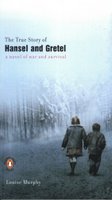Two children are with their father and stepmother running from the Nazis. They figure the best hope is to leave the children to hide and maybe find a villager to take them, while the parents keep going. When the parents drop off the children, the stepmother yells that they must never say their names, and tells them their names are Hansel and Gretel. They all do get away from the Nazis, and then the reader follows both stories. The children find their way to a woman who lives outside the village, whose grandmother was a gypsy, and who decides to do what is right and what her grandmother would have done instead of living in fear. Largely a story of children who are children and yet are not children. Of what hope looks like in darkness. What one can withstand when one has others to stand with. What is worth fighting for.
Enjoy retelling of fairy tales -- but it's so easy to forget that the original fairy tales were not light stories, but had lots of darkness in them. Murphy probably falls into a similar category as Flannery O'Connor -- believing that to show hope and light, you must also show darkness and evil. And so many of the things that happened in world war two were evil, so when writing a book .. it must include evil too. Which is true of life. Without darkness and evil making themselves known, it is easy to miss God, good, beauty, light, truth. And murphy has the privilege of reckoning with God in the midst of such evil. Many characters comment on this, often about God packing up and leaving Poland when the war came. Or there being no God because of things they had seen. One comment which is still echoing around in my head comes from an old man who replies the following to such a comment. "God didn't come down and kill us. I don't see god shooting children and priests. None of us met God beating up Jews and shoving them into railroad cars. This is men doing the murdering. Talk to men about their evil, kill the evil men, but pray to God. You can't expect God to come down and do our living for us. We have to do that ourselves." (p207)
The sister is older and takes care of her brother. She worries about him and helps him to understand the important things he can do, should do, shouldn't do -- what it will take for the two of them to survive. Due to trauma, he must assume this role of caretaker for his older sister. Everything they know crumbles when the war ends, and he has to decide what to do and where to go. So he does, but it is wearing to have so little to hope for and also to be the leader. Another traumatic event brings her back into reality (not sure if this is really possible or how often it happens?) -- and she becomes the big sister again. Which gives her little brother rest. For the first time in weeks he actually sleeps soundly. We all have tasks and roles that we are given. Some of which are easy and familiar and fit our talents and personality -- but sometimes we are expected to things which we cannot do. Which, in our own strength, are truly impossible. But it's reassuring to know that God has more strength than we do. That in Him our inability and weakness become something worthwhile. Hard to accept and harder to live -- but there is hope to sleep soundly at night, because I am not in control and don't need to be.
| Title: | The True Story of Hansel and Gretel: a novel of war and survival |
|---|---|
| Author: | Louise Murphy |
| Date published: | 2003 |
| Genre: | Historical Fiction |
| Number of pages: | 297 |
| Notes: | borrowed from amy |



0 comments:
Post a Comment